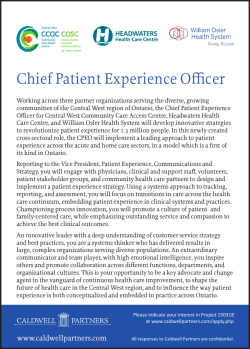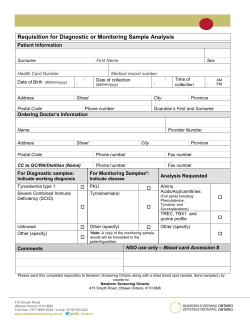
Adjudication - Osgoode Professional Development
Learn to run a fair and effective administrative proceeding The Certificate in Adjudication for Administrative Agencies, Boards & Tribunals A joint program of the Society of Ontario Adjudicators and Regulators (SOAR) and Osgoode Professional Development December 7-11, 2015 | Toronto, Canada Why You Should Attend Program Details This five-day intensive training program for adjudicators is a collaboration between the Society of Ontario Adjudicators and Regulators (SOAR) and Osgoode Professional Development of Osgoode Hall Law School, York University. The program brings together SOAR’s peer-driven model of adjudicative education and OsgoodePD’s leadership in legal education. Dates The Certificate Program in Adjudication for Administrative Agencies, Boards & Tribunals has set a new standard for the delivery of education and training for administrative adjudicators in Ontario and beyond. This is an introductory program, which will meet the needs of relatively recent appointees to obtain a solid grounding in the goals and principles of the administrative justice system, while learning and practising practical adjudication skills. It will also provide an opportunity for more senior adjudicators to review best practices and explore evolving issues in adjudication. Day One Introduction to Administrative Adjudication Key Principles: Administrative Law & the Administrative Justice System December 7, 2015 Day Two How to Run a Hearing: Fairness & Efficiency December 8, 2015 Day Three Administrative Adjudication: Evolving Challenges December 9, 2015 The program will be held at OsgoodePD’s Downtown Toronto Conference Centre 1 Dundas Street W., 26th Floor Toronto, ON For Further Program–related Information Please contact: Heather J. Gore Liddell Senior Program Lawyer Osgoode Professional Development at 416.597.8847 or email hgore@osgoode.yorku.ca Completion of this program will prepare you for the unique challenges of administrative adjudication, build confidence, and strengthen your capacity to contribute effectively to your organization. Day Four Decision-writing: Key Principles & Effective Strategies December 10, 2015 Day Five Hearing Simulation: Putting It All Together December 11, 2015 The teaching and learning will be interactive and hands-on. Working with fact scenarios, problems and video demonstrations, you will learn how to meet the legal requirements of administrative adjudication, while also offering efficient and effective public service. You will complete a decision-writing exercise, and the program will be capped off with a hearing simulation. The simulation will enable you to apply what you’ve learned during the week, and obtain valuable individual feedback from recognized experts in this field. Key Benefits • Acquire an understanding of the key principles of administrative law • Learn how to run a hearing – from start to finish • Review the legal and practical requirements for administrative decisions • Explore the evolving challenges faced by administrative adjudicators • Discuss common challenges, and successful strategies, with other adjudicators • Gain insight from experienced adjudicators and leaders in administrative justice Plus! You will be able to apply and test your skills through a hearing simulation and practice decision-writing in a guided exercise. Who Should Attend This program will be relevant to anyone who is exercising adjudicative functions arising from a public or quasi-public power, including: • Recent and prospective appointees to administrative agencies, boards and tribunals • Professional regulators • Members of disciplinary bodies • Adjudicators from the provincial, federal or municipal sectors • Leaders required to conduct hearings in the broader public sector, including health and education • Professionals seeking to transition into an adjudicator role THE CERTIFICATE IN ADJUDICATION FOR ADMINISTRATIVE AGENCIES, BOARDS & TRIBUNALS Over FIVE intensive consecutive days, you will be taught by leading experts, using a blended-delivery method that includes lectures, class discussions and hands-on exercises. THE CURRICULUM December 8, 2015, 9:00 a.m. – 4:30 p.m. DAY 1 December 7, 2015, 9:00 a.m. – 4:30 p.m. DAYS 2 & 3 December 9, 2015, 9:00 a.m. – 4:30 p.m. Introduction to Administrative Adjudication How to Run a Hearing: Fairness & Efficiency •Introductions and outline of course objectives •The role of statutory agencies, boards and tribunals •Before the hearing begins: case management, preliminary rulings, preparation, mediation •Guiding principles: fairness, independence, accountability, efficiency, diversity, accessibility •Starting the hearing: openings, setting the tone, instructions to the parties, agreed statements of facts •Sources of jurisdiction and law •Protection of privacy in adjudication •Refresher on the law of evidence: key principles for tribunal settings Key Principles: Administrative Law •Sources of procedural fairness: common law, statutory procedural requirements, constitutional rights •Key components of procedural fairness: the right to be heard, the rule against bias •The basics of judicial review •Independence and impartiality Topics will be explored with the assistance of special presenters, using power-point presentations, discussion of best practices, Q & A’s. Fireside Chat - “Administrative Justice in the Legal System” Leading figures in the administrative justice community will discuss the role of administrative adjudication and its place in the justice system. •Hearing evidence: oaths and affirmations, cautioning witnesses, admitting documents and other exhibits, experts, note-taking and other practical tips •Managing the hearing: handling and ruling on objections, time management, civility and decorum •Closing the hearing: considerations for decision making Administrative Adjudication: Evolving Challenges •Active adjudication: techniques and risks of intervention, tribunal policies, the use of inquisitorial techniques, benefits of active listening and questioning techniques •Dealing with self-represented parties: strategies for effective participation, common challenges, hearing accommodation •Inclusive and accessible adjudication: cultural intelligence, mental health challenges, accommodation in hearings, use of interpreters Topics will be covered using video demonstrations, power-point presentations, small-group work on problems drawn from actual hearings, discussion of best practices, Q & A’s. What past participants said about the Certificate in Adjudication: “For a number of reasons, most importantly the hearing simulation, I will have no hesitation in recommending this course.” Fireside Chat – “Evolving Challenges” Leading figures in the administrative justice community will discuss the evolving challenges faced by experienced administrative adjudicators. “No other way to put it, this session is by far the best I have ever taken... Very engaging and never a dull moment. Well done and thank you!” “Fantastic! Effective and fun! Targeted all learning styles and levels of experience.” “Content delivered in plain language, clear explanation of complex concepts, practical advice.” “The content was fabulous, it almost seemed easy! It was so well presented!” Register online today at www.osgoodepd.ca DAY 4 December 10, 2015, 9:00 a.m. – 4:30 p.m. Decision-writing: Key Principles & Effective Strategies •Key Principles: Clarity & Conciseness •Context and point-first writing •Effective introductions •Issue-driven structure •The duty to give reasons: source of the duty, key principles, leading cases, common sufficiency problems •Practical strategies for approaching decision-writing: organizing the material, creating an outline, considering the law •The elements of a good decision: finding the facts, dealing with credibility, review of the law, applying the law, sequencing PROGRAM DIRECTOR Pamela Chapman is an educator and adjudicator who combines these skills to develop and deliver training on a wide range of topics, to diverse groups of all sizes, including lawyers and non-lawyers, tribunals, courts, regulators and other agencies. Ms. Chapman has taught at the Faculty of Law at the University of Ottawa since January 2002, and has been an adjunct professor at Osgoode Hall Law School and the University of Toronto. From 2009 to 2012 she was a part-time member of the Human Rights Tribunal of Ontario, and from 1993 to 2002 a Vice-Chair of the Ontario Labour Relations Board. Since 1995 she has also worked as a labour arbitrator and mediator. •Writing for multiple audiences Participants will work with facilitators in small groups throughout the day, to revise draft passages and apply best practices. The day concludes with an introduction to the hearing simulation taking place on Day 5. Roles will be assigned and the fact situation will be introduced, in addition to clarification on rules, tips and required preparation. DAY 5 December 11, 2015, 8:30 a.m. – 3:30 p.m. Osgoode Hall Law School’s Osgoode Professional Development offers both credit and non-credit programming to meet the life-long learning needs of lawyers and other professionals who need legal information. Osgoode Hall Law School is one of the world’s pre-eminent law schools. OsgoodePD embodies the law school’s commitment to meeting the educational needs of the broader community and has offered many continuing legal education programs in the areas of administrative law, professional and statutory regulation, and alternative dispute resolution, including its Professional LLM in Administrative Law. www.osgoodepd.ca Hearing Simulation: Putting It All Together •Participants will be assigned to hearing panels, and will rotate acting as Chair of the panel •They will hear a concise administrative application, presented by volunteer coaches, all experienced counsel and adjudicators •Participants will have a chance to engage in hearing management, including ruling on objections and dealing with various procedural challenges •Panels will confer on procedural rulings and the outcome of the case, and deliver a brief oral judgment at the end of the day •Volunteer coaches will provide detailed feedback, and there will be group discussion of strategies The day will finish with a reflection and group debriefing, followed by a graduation ceremony. The Society of Ontario Adjudicators and Regulators (SOAR) was created in 1991 for the purpose of advancing administrative justice through education, advocacy and innovation. Membership in SOAR includes Order-in-Council appointed Chairs and Members and staff of administrative justice system agencies. SOAR supports their work through various activities, including training programs for newly appointed adjudicators and administrative staff, conferences and other educational programs, and participation in policy initiatives of relevance to the direction and integrity of the administrative justice system. The premiere event in Ontario’s administrative justice community is the SOAR Conference that takes place in Toronto each year. SOAR is explicitly non-partisan and non-profit; its focus is the public interest. www.soar.on.ca © Osgoode Professional Development, 2015 Register online today at www.osgoodepd.ca The Certificate in Adjudication for Administrative Agencies, Boards & Tribunals draws upon the expertise and experience of leading adjudicators, academics and counsel from the administrative justice community. Past faculty has included: Benjamin Berger, Associate Professor, Osgoode Hall Law School Freya Kristjanson, Cavalluzzo Shilton McIntyre and Cornish LLP Christopher D. Brecht, Partner, Borden Ladner Gervais LLP The Hon. Justice Susan Lang Court of Appeal for Ontario Sandra (Sandi) Driesel, Member, Assessment Review Board/Environment & Land Tribunals Ontario The Hon. Justice John Laskin Court of Appeal for Ontario The Hon. Justice John Evans Federal Court of Appeal James (Jim) Girling, Legal Director, Divisional Priority Projects, Legal Services Division, Ministry of the Attorney General Janice Gauthier, Chair, Health Professionals Appeal & Review Boards David Goodis, Senior Counsel, Information and Privacy Commissioner of Ontario James Gorham, Counsel, Department of Justice Canada Michael Gottheil, Executive Chair, Social Justice Tribunals Ontario The Hon. Justice Stephen Goudge Court of Appeal for Ontario Louise Horton, Member, Landlord Tenant Board Sophie Martel, Vice-Chair, Workplace Safety and Insurance Appeals Tribunal Michael Newman, Vice-Chair and Senior Lawyer Member, Consent and Capacity Board Marsha Faubert, Vice-chair, Former Director Workplace Safety & Insurance Appeals Tribunal Lorne Sossin, Dean Osgoode Hall Law School “I’m enormously proud to co-Chair the Certificate in Adjudication, which brings together SOAR’s commitment to peer-led, relevant, hands-on adjudicative education with Osgoode’s commitment to excellence in its state-of-the-art professional and executive certificate programs.” Susan Opler, Vice-Chair Consent and Capacity Board, Ontario; Member, Law Society Tribunal Carole Prest, Counsel to the Tribunal Chair Workplace Safety and Insurance Appeals Tribunal Jo-Ann Seamon, Senior Counsel & Manager of Legal Services, Human Rights Legal Support Centre Carol Street, Symes, Street & Millard LLP The Hon. Justice Kevin Whitaker Ontario Superior Court of Justice (Toronto) Former Chair, Ontario Labour Relations Board David A. Wright, Chair Law Society Tribunal ADVISORY COMMITTEE Robert Butterworth, Q.C., Vice-chair Assessment Review Board/Environment & Land Tribunals Ontario C0-CHAIRS The Hon. Justice Edward F. Ormston Chair, Consent and Capacity Board of Ontario Josée Turcotte, Deputy Secretary and Independent Adjudicative Counsel Ontario Securities Commission Zeynep Onen, Director, Professional Regulation Law Society of Upper Canada “The delivery of administrative justice requires highly skilled and trained members of agencies, boards and tribunals. As a non-profit, non-partisan organization with deep roots in the administrative justice community, SOAR has been a trusted provider of administrative adjudicator education in Ontario for many years. Building on that experience, SOAR’s innovative partnership with Osgoode in this program will provide new administrative adjudicators with the skills and knowledge they need to become effective decision makers.” Debra Roberts, Deputy Chief of Staff, Human Resources and Public Appointments Office of the Premier, Ontario Register online today at www.osgoodepd.ca Emanuela Heyninck, President, SOAR Commissioner, Pay Equity Commission “SOAR is committed to providing innovative and high-quality education and training to our community. SOAR’s Adjudicator Training Course has provided an introduction to adjudication to generations of decisionmakers in Ontario and beyond. We look forward to training a new generation through this collaboration with Osgoode.” THE CERTIFICATE IN ADJUDICATION FOR ADMINISTRATIVE AGENCIES, BOARDS & TRIBUNALS WINTER 2015 REGISTRATION Space is strictly limited to ensure hands-on learning and feedback. Register now! Name: Title: Firm/Company: Practice Area: Address: Year of Call (if applicable): City: Province: Postal Code: Fax: Priority Service Code: Email: Telephone: 1 5 0 7 O L Please add me to your mailing list. Please delete me from your mailing list. If you do not wish to be contacted by e-mail, indicate here. Fee Per Delegate $2,750 plus 13% HST for a total of $3,107.50. Fees include attendance, program materials, continental breakfast, lunch and refreshments for each of the five days of the program. The price does not include accommodations. Dress is business casual. Need accommodations? Check our website at www.osgoodepd.ca/hotelandparking.html Payment Options — Payment must be made prior to the program Cheque enclosed (payable to York University — HST/GST# R119306736) Bill my credit card: VISA Mastercard Card# Expiry: Signature: Payment Amount: OsgoodePD has been approved as an Accredited Provider of Professionalism Content by the LSUC. CPD Credits Eligible CPD/MCLE hours: LSUC (ON): 32.0 CPD Hours (22.5 Substantive, 9.5 Professionalism); NY CLE: 35.0 credit hours in the Area of Professional Practice for transitional and non-transitional lawyers. OsgoodePD programs may be eligible for CPD/MCLE credits in other Canadian jurisdictions. To inquire about credit eligibility, please contact cpd@osgoode.yorku.ca. Program Changes We will make every effort to present the certificate program as advertised, but it may be necessary to change the dates, location, speakers or content with little or no notice. In the event of program cancellation, York University and Osgoode Hall Law School’s liability is limited to reimbursement of paid fees. Cancellations/Rainchecks/Substitutions If you are unable to attend the program your organization may name a replacement. A full refund will be issued for cancellations received a minimum of 21 days before the program start date. Written cancellations received after November 23, 2015 will include an administration charge of $700. Non-attendance or withdrawal on or after the program start date will incur a full program fee. Payment must be received by November 23, 2015. Certificate of Program Completion Location You will receive a certificate upon completion of The Certificate in Adjudication for Administrative Agencies, Boards & Tribunals. Participants must attend all days and participate in the hearing simulation to receive a certificate. Osgoode Professional Development Downtown Toronto Conference Centre 1 Dundas St. W., 26th Floor, Toronto, ON, M5G 1Z3 Public CLE Seminars Customized CLE Programs 4 Convenient Ways to Register 1. MAIL your registration form to: Osgoode Professional Development Downtown Toronto Conference Centre 1 Dundas St. W., 26th Floor Toronto, ON M5G 1Z3 2. ONLINE at www.osgoodepd.ca 3. FAX your registration to 416.597.9736 4. CALL US at 416.597.9724 or 1.888.923.3394 Skills Training & Certification ITAW Professional LLM
© Copyright 2025









